IP Oddments


IP Oddments



We Seek to
Care enough to Speak Honestly;
Be Aware enough to Speak Kindly; and,
Be Wise enough to Speak Persuasively.
Balanced Counsel—
for Smart Clients®
About KeganLaw
Since 1940, Kegan & Kegan, Ltd. has provided its clients personalized strategic advice, preventative guidance, and when needed crisis counseling and defense.
We identify, develop, and protect intangible business assets—trademarks, copyrights, patents, trade secrets, contracts, websites—and counsel other professionals on legal issues.

KeganLaw Pages

Notice—Laws Change
The law is constantly changing. Moreover, no general discussion can incorporate all the specific facts of your particular situation. Consult an attorney for particular legal questions.

Litigation Oddments
Litigation Akin to 14th Century Siege

Barbara W Tuchman, A Distant Mirror: The Calamitous 14th Century, 1978.
Nuremberg Trials

A fundamental cleavage, which persisted throughout the negotiations, was caused by the difference between the Soviet practice, under which a judicial inquiry is carried on chiefly by the court and not by the parties, and the Anglo-American theory of a criminal trial, which the Soviet jurist rejects and stigmatizes as the ‘contest theory.’ The Soviets rely on the diligence of the tribunal rather than on the zeal and self-interest of adversaries to develop the facts. Another fundamental opposition concerns the function of a judiciary. The Soviet views a court as ‘one of the organs of government power, a weapon in the hands of the ruling class for the purpose of safeguarding its interests.’
The most serious disagreement, and one on which the United states declined to recede from its position even if it meant the failure of the Conference, concerned the definition of crime. The Soviet Delegation proposed and until the last meeting pressed a definition which, in our view, had the effect of declaring certain acts crimes only when committed by the Nazis. The United States contended that the criminal character of such acts could not depend on who committed them and that international crimes could only be defined in broad terms applicable to statesmen of any nation guilty of the proscribed conduct.

Report of Robert H Jackson, United States Representative to the International Conference on Military Trials, London 1945.
Trial by Jury, Gilbert & Sullivan

Now, Jurymen, hear my advice -
All kinds of vulgar prejudice
I pray you set aside,
I pray you set aside:
With stern judicial frame of mind,
From bias free of ev'ry kind,
This trial must be tried!
Usher.
Silence in Court!
Silence!
Chorus.
From bias free of ev'ry kind,
This trial must be tried.
Usher.
Oh, listen to the plaintiff's case:
Observe the features of her face -
The broken-hearted bride.
Condole with her distress of mind:
From bias free of ev'ry kind,
This trial must be tried!
Usher.
And when amid the plaintiff's shrieks,
The ruffianly defendant speaks -
Upon the other side;
What he may say you needn't mind -
From bias free of ev'ry kind,
This trial must be tried!
Defendant.
Hear me, hear me, if you please,
These are very strange proceedings -
For, permit me to remark
On the merits of my pleadings,
You're at present in the dark.
Salem Witch Trials, 1692

Copyright © KeganLaw 2009-2018. All Rights Reserved.
